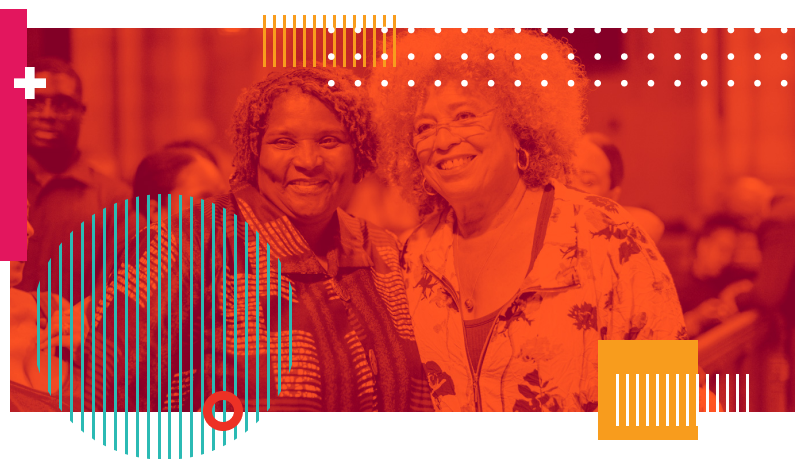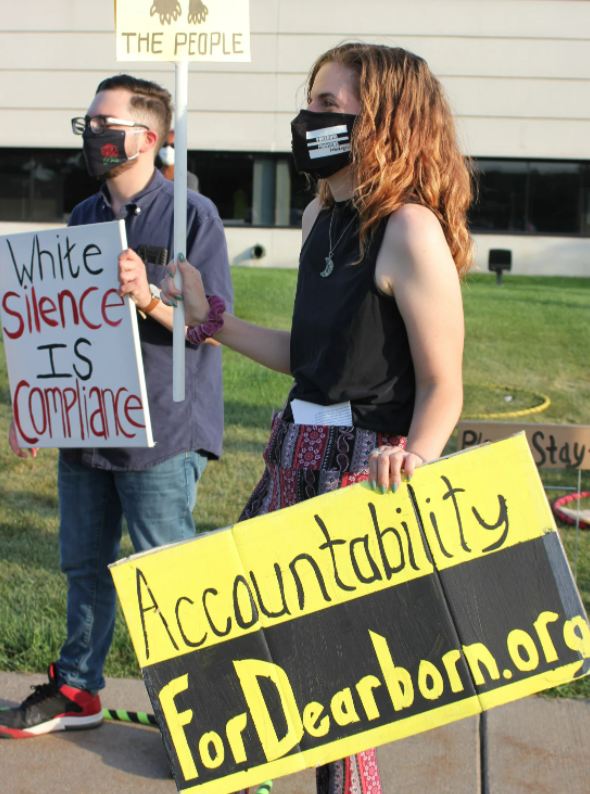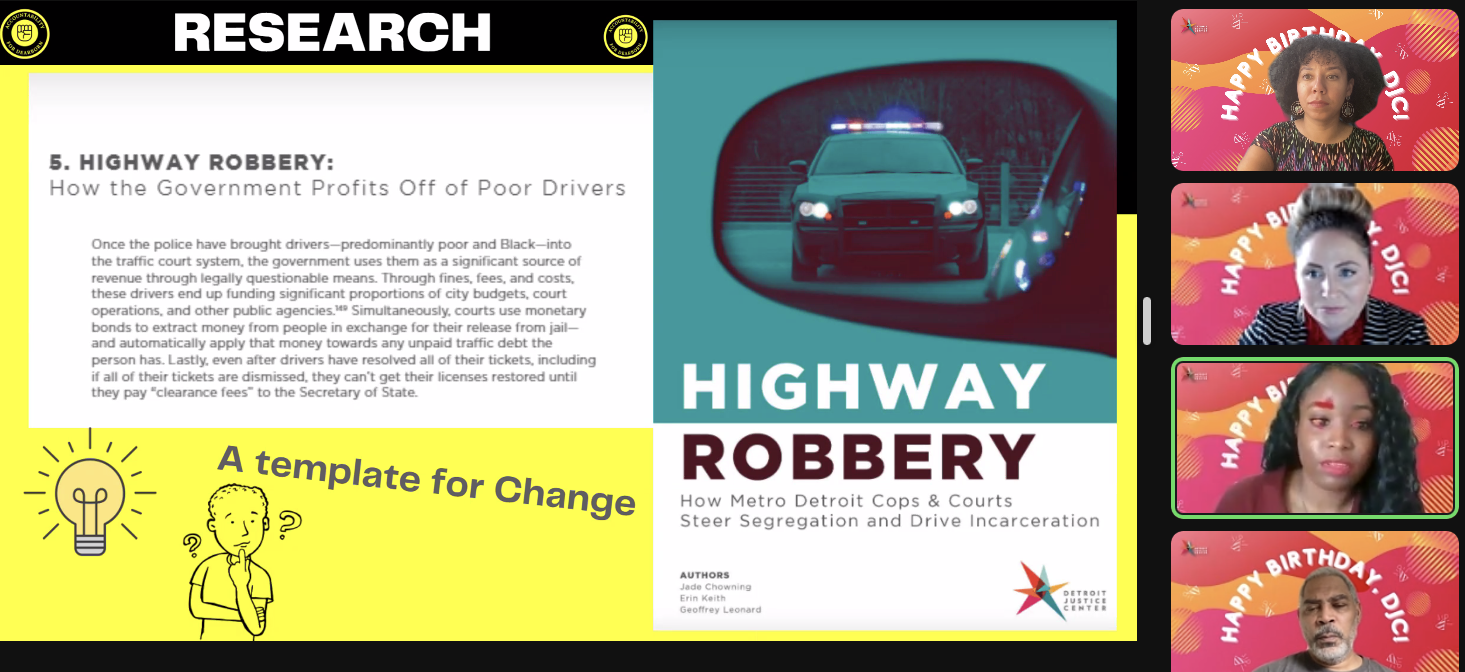
Many Detroiters—and, by extension, their families—are shut out of the formal economy because of a criminal record, suspended driver’s license, outstanding warrant, or crushing criminal justice debt. Our Legal Services Practice removes these types of legal barriers, helping clients remain out of jail, hold onto jobs and stable housing, and keep their families intact. Keep in mind, we here at DJC only get legal clients from our referral partners. We also house a unique program of three Community Legal Advocates who assist Detroiters with property tax assessment appeals, setting up LLCs, and record expungement.
Since opening our doors, we’ve been a part of the movement to end incarceration. We’ve been a part of the “No New Jails Detroit” Coalition, fighting against the construction of the Wayne County Criminal Justice Complex. Our Founding ED, Amanda Alexander served on Governor Whitmer’s Task Force on Jails and Pretrial Incarceration where we encouraged community members to come out and testify to their experiences with incarceration and show legislators how directly impacted people had their lives upended by incarceration. The Task Force held meetings across the state of Michigan, including in Genessee County Jail in Flint, MI where currently incarcerated people were able to speak directly to the task force about the conditions they endured. In addition to advocacy, we’ve also represented clients who were incarcerated in Wayne County Jails during the outbreak of Covid-19 in early 2020, and were part of the legal team responsible for getting a number of people out of the jail’s unsafe conditions during that time.
Our attorneys have represented a number of clients who have experienced the cycle of unfair fines and fees in traffic court. Identifying patterns within policing and traffic courts, our attorneys put together the Highway Robbery report, which details a system of racist policing that leads to cycles of poverty for our clients and many others across Metro Detroit. Historically, segregation has played a role in the operation of our traffic courts, and we still see disproportionate traffic enforcement impacting Black and Brown drivers in SE Michigan to this day. Our attorneys have created a series of toolkits for stakeholders of all kinds to reduce the criminalization of poverty that we see occurring in our courts. Additionally, our attorneys have participated in the “Road to Restoration” clinics across the state, helping people get their licenses reinstated with the MI Secretary of State.
Returning citizens face a number of legal and economic challenges to re-entering their communities, and our attorneys work with them to meet those challenges head-on.
One of the biggest issues returning citizens face are barriers to employment and access to social services based on their records. It is our belief that a person’s record shouldn’t cost them access to the things they need to survive. As part of the MI Task Force on Jails and Pretrial Incarceration, we argued for an overhaul of the expungement system. As of January 2021, Michigan passed Clean Slate legislation that made it easier for many Michiganders to seal their records. In the wake of this legislation passing, we realized that it wasn’t having the intended impacts it should have had across the state, with the process still being confusing to many people. Our Community Legal Advocates have been working with directly impacted communities to ensure that they’re able to access Clean Slate through expungement clinics.
Many returning citizens, our clients included, face insurmountable debt in child support when they leave prison. While child support payments are supposed to be put on hold when a person is incarcerated, often parents are not made aware of this fact. This can leave returning citizens in a cycle of debt in addition to the numerous economic barriers they face. Our attorneys assist our clients with reducing or eradicating the amount of child support debt they owe.
Our attorneys help clients amend custody and parenting time orders and give legal support to returning citizens and court-involved individuals to reunite parents with their children.
We work with Detroit Eviction Defense to assist Detroiters in eviction cases and to help raise visibility on the issue of illegal police evictions in Detroit. Our collective efforts recently passed a Right to Counsel ordinance in Detroit which determined that anyone facing eviction has a right to legal representation in court. Our attorneys do direct representation but also have a focus on bigger-picture advocacy projects regarding evictions. One of our attorneys filed a lawsuit against Detroit Police Department for an illegal eviction that occurred in 2021.
In addition to our eviction work, our Community Legal Advocates (CLAs) have worked with hundreds of Detroiters to lower their property tax assessments. Incorrect assessments have led to foreclosures across the city when people could not afford to pay their over-assessed property taxes. Our CLAs walk people through the appeal process and help Detroiters stay in their homes by ensuring that over-assessed properties are adjusted by the board of assessors every winter.
Our team has created a number of infographics to help people better understand the issues with policing specific to SE Michigan. We also put on Know Your Rights workshops for youth in Detroit to help them better understand their rights when interacting with police.

Image courtesy of Press & Guide.
Community partner of the Detroit Justice Center – Accountability 4 Dearborn – is celebrating huge and hard-fought victories after nearly two years of organizing their community toward carceral abolition and Black liberation.
Accountability 4 Dearborn (A4D) is a grassroots group of Dearborn residents who are “working to build a culture and expectation of accountability and action in the city to make the city safe for Black residents, students, employees, and visitors” (Accountability 4 Dearborn).
The Dearborn chief of police recently announced that the police department is:
The police department has launched a data transparency dashboard and modified the online civilian complaint form to accept anonymous complaints, as well.
Lead organizer with A4D, Alexandria Hughes, was featured as a special guest at DJC’s 4th birthday party last month, highlighting the impact that DJC and our community partners have made in a short amount of time.
During her presentation, Alexandria made it clear: “None of [these victories] were on their radar before our work began 18 months ago. When we started, most people were advising us to politely wait for anti-Black racism to go away.”
DJC is proud to have supported this progress through the research and policy recommendations we produce, intended to help guide grassroots organizations like A4D, who bring them to life through people power and persistence.
We recognize that these policy wins are wins for residents of Dearborn and for Detroiters.
Detroiters are not only profiled and impacted by Detroit’s police department.
Because of a long history of segregation, most Detroiters have to travel to majority-white suburbs to access jobs, healthcare, and other resources. This includes suburbs like Dearborn.
Our Metro Detroit Policing Graphics reveal that nearly ¾ of arrests made by Dearborn PD are along the Detroit border, disproportionately targeting Black people.
Disbanding the Border Crimes Initiative Team is, therefore, a win for all Detroiters.
We outline in our Highway Robbery report that metro-Detroit police spend the bulk of their time performing traffic stops for things like plate violations. These minor infractions often kickstart a vicious cycle of ticketing, arrest, and incarceration – producing criminal records that haunt people for the rest of their lives.
Ending traffic stops for plate violations in Dearborn is, therefore, a win for all Detroiters.

As exciting as it was to celebrate this shared progress at our birthday party, the work continues. Alexandria ended her presentation with a variety of ways community members can plug in to the movement:
It takes us all – organizations like DJC, grassroots groups like A4D, and YOU! – to bring about real safety and an end to racist policing.
Support DJC by making a birthday gift to sustain our work for another four years.
DJC plays a vital role in shaping change and ensuring it is true to the values and needs of those most impacted by anti-Black racism and policing.
We’re honored to do this work in partnership with groups like Accountability 4 Dearborn for as long as it is needed.
2018 lawsuit against Wayne County– In 2018, DJC, on behalf of several Wayne County residents, filed suit in the US District Court for the Eastern District of Michigan to prevent the issuance of bonds by Wayne County to fund construction of a new criminal justice center. The legal theory was that by failing to provide sufficient notice of the bond issuance, as required under both the Michigan and United States Constitutions, the Wayne County failed to fulfill its statutory obligations and deprived its residents of their fundamental rights without due process. Plaintiffs sought an injunction against the issue and sale of the bonds until 45 days after notice meeting due process standards is provided, and other appropriate relief.
DJC sought a temporary restraining order pending final adjudication. The order was denied at the district court level and, again by the 6th Circuit Court of Appeals. In the end, we voluntarily dismissed the case after the delay in determining whether Plaintiffs were entitled to a TRO permitted the County (after some delay) to issue the bonds, mooting the case.
2020-21 COVID-19 lawsuit– From 2020-2021, DJC served as co-counsel of a lawsuit aimed at improving sanitary conditions at the Wayne County Jail, amid the height of the COVID-19 pandemic. Our presence on the lawsuit team helped with expediting the pretrial release of individuals held pretrial, through the Administrative Jail Release (AJR) process, ensuring masks, hygiene products, sufficient cleaning products, and other sanitation materials were made available to those detained during the lawsuit’s duration, promoting testing standards and social distancing, working to ensure vaccine accessibility, and otherwise preventing the spread of the virus among those held in the Wayne County Jail.
2022 DPD eviction lawsuit– We currently have an important lawsuit going against the City of Detroit, four of its police officers, and a local landlord for illegally evicting a woman named Whitney Burney and her two children. The case is Whitney Burney, Jaylen Jordan, and Nyla Jordan v. The City of Detroit, Detroit Police Officer Hadeel Masseoud, Detroit Police Officer Onesimo Gutierrez, Office John Doe #1, Officer John Doe #2, and Santea Bryant. It’s Case No. 21-016992-CZ in Wayne County Circuit Court. Here is some news coverage of the case.
Ms. Burney was illegally evicted after her landlord, who had sexually harassed her, falsely told the police that she was a squatter. The police, without conducting any reasonable investigation and despite plenty of evidence that contradicted the landlord’s claim, forced Ms. Burney and her children out of their home. Ms. Burney and her children lost all of their possessions and were homeless until a fundraising effort helped her find a new place.
We launched this litigation because there has been a systemic problem with police officers illegally evicting tenants, particularly black women, based on dubious claims made by landlords. Landlords often make these claims to retaliate against tenants and/or to circumvent the legal eviction process. Police have repeatedly and systemically failed to adequately investigate these claims and follow or understand the law regarding tenant rights. This practice further exacerbates problems with homelessness and housing instability among Detroit’s low-income tenants, predominantly black women.
That’s why as part of our lawsuit we are suing the City of Detroit for having policies and practices that inevitably lead to the violation of the Constitutional rights of Ms. Burney and tenants like her, including failing to adequately train officers or hold officers accountable for violating tenant rights. I have attached the complaint in that lawsuit which explains how our clients’ Fourth and Fifth Amendment rights under the Constitution were violated by the police.
We view this litigation as part of a larger campaign led by local movement groups, including Detroit Will Breathe and Detroit Eviction Defense, to advocate for an end to police-conducted evictions in Detroit. We hope that our litigation will help force the Detroit Police Department to change its policies and procedures so that what happened to Ms. Burney won’t happen again. We have crafted the litigation to have a systemic impact on the approach of local police departments to tenant rights and claims of squatting.
People v. Poole amicus brief– DJC filed the People v. Poole amicus brief urging the Court to hold that sentencing young adults to a mandatory life sentence is cruel or unusual punishment as the scientific community has extensively reported neurological studies, which conclude that young adults are still developing their full adult brain functions and are, therefore, should be deemed less culpable than fully mature adults for similar crimes. The brief also demonstrates glaring racial disparities, which reveal how these mandatory sentences are more likely to be imposed on black defendants than defendants of any other race. DJC celebrated the July 2022 decision from the Michigan Supreme Court which agreed that young adults, who were age 18 when they committed their offense, should not be sentenced to mandatory life in prison and that their youth and other mitigating factors should be considered to give them a chance at rehabilitation and parole. DJC filed an amicus brief in support of the ruling.
People v. Johnson amicus brief– DJC filed the People v. Johnson amicus brief urging the Court to strike down the statute that gives a sentencing judge authority to impose court costs on defendants, who have been convicted and sentenced by that judge. The practice occurs when a judge, who can “fundraise” from convicting a defendant of a crime, and then sentencing that person to pay the court back for its “costs” in prosecuting the defendant. This creates a “conflict of interest” and perverse incentive for the judge to be motivated to find someone guilty so the court can raise operational funds from the convicted defendant. The practice violates the Constitution’s guarantee of due process. DJC celebrated the July 2022 order from the Michigan Supreme Court granting further argument on whether this statute is unconstitutional. DJC will join again with its partners to argue that the statute is unconstitutional and ask that it be overturned.